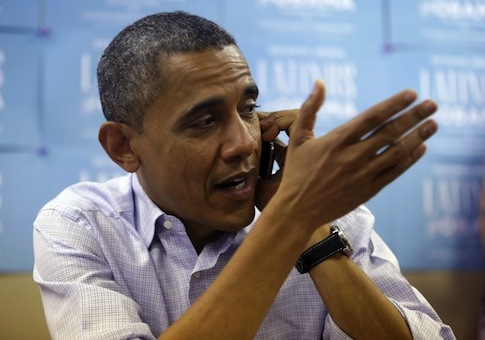A company that has made more than $1 billion off Lifeline, a government program that provides free cell phones, has launched an ad campaign to defend the program, which is under scrutiny for widespread fraud and abuse.
TracFone Wireless, Inc. has been running print advertisements for six months in defense of a program that spent $1.7 billion in providing cell phones to low-income individuals in 2012.
"Lifeline isn’t breaking the bank," the ads read. "It doesn’t add one penny to the deficit. If you’re looking to cut the deficit, Lifeline is the wrong place to start."
Lifeline is a Federal Communications Commission (FCC) initiative that began in the 1980s to provide landline phones to people who could not afford them. The program was expanded in 2008 to include wireless phones, causing its budget to soar into the billions.
Cell phone companies are paid per subscriber, incentivizing providers to sign up as many as possible, often in violation of rules that require someone to be on welfare or below the federal poverty line.
FCC Chairman Julius Genachowsk told the Hill that adding wireless "created perverse incentives for some carriers" and "invited fraud and abuse."
Reports found that 41 percent of subscribers could not demonstrate their eligibility for the program, and a reporter from National Review was able to get three free "Obamaphones" in one month. The FCC identified $214 million in duplicate subscriptions in 2012.
One of the biggest critics of the program on Capitol Hill is Rep. Tim Griffin (R., Ark.), who calls the program "Uncle Sam’s unlimited plan." Griffin has long opposed the program for its waste, which includes sending phones to dead people.
TracFone itself is facing more than $4 million in fines by the FCC for signing up customers multiple times.
The TracFone ads say Lifeline is a "vital program" that is "not even part of the budget … So taking it away would have no impact on cutting the deficit or debt."
Though Lifeline is not a line budget item, taxpayers do fund the program by paying fees through their phone bills. All mobile providers are required to pay into the Universal Service Fund, mandated by the FCC, which pays for the program.
For example, a Verizon plan for a family of four is charged about $3.49 a month for the Federal Universal Service fee.
The fees add up to billions. Since cell phones were added, disbursements from the program have increased from $771.7 million in 2008 to $2.19 billion in 2012. Wireless accounted for $1.744 billion of that total.
Cell phone companies are reimbursed as much as $10 per person they sign up, and one of the biggest providers is TracFone.
TracFone has collected $1,683,168,209 from Lifeline since 2008, according to the Universal Service Administrative Company (USAC), a nonprofit corporation of the FCC that administers the program.
The company is a subsidiary of América Móvil, which is owned by the "world’s richest man" Carlos Slim, who has a net worth of $73 billion.
Slim has a controlling stake in TracFone. The company petitioned the FCC to expand Lifeline to include wireless phones in 2005.
A spokesperson for TracFone told the Washington Free Beacon the company does have an interest in their profits.
"We’re a company, we’re for-profit, absolutely we make money, yes," said José A. Fuentes, when asked about the ads bias due to TracFone’s stake in the program. "I think anybody who says, ‘No, absolutely not, we don’t want to make money,’ is crazy."
"But it’s not about the profitability here," he said. "The FCC a few years ago felt that there was a need to improve Lifeline. We came in and created a business model that worked."
Fuentes said the advertisements are designed to combat "misinformation" about Lifeline. TracFone will soon expand its campaign to the digital market, but Fuentes would not disclose how much the company is spending.
"We just felt that it was necessary to dispel the myths—one of the biggest myths is that the federal government is giving away free cell phones," he said. "That’s not even the case. The cell phones are actually paid for by the companies themselves."
Fuentes said the reason the program has expanded so rapidly is due to the poor economy and blamed Congress for not passing jobs bills.
"There’s a direct correlation with the number of people on Lifeline to the number of people unemployed," he said. "The explosion exists because Congress hasn’t done its job in creating meaningful programs to get people back to work. And Congressman Griffin is one of them."
TracFone was sanctioned $4.5 million by the FCC for signing up people for Lifeline who were already subscribed.
"The violations involve thousands of consumers who had more than one Lifeline subscription from the same provider, resulting in duplicative support requests and payments," the FCC said.
TracFone disputed the claim in a statement responding to the penalty contending the duplicate subscriptions only amounts to $8,000.
Griffin said the case is indicative of the program.
"More than five years after it expanded the Lifeline program, the FCC has yet to create national databases to check for duplication or eligibility of Lifeline recipients," Griffin said in a statement to the Free Beacon. "Meanwhile, working moms and dads are forced to fund a program that has paid out billions of dollars to billionaires like Carlos Slim."
"That's just not fair, and that's why I've introduced a bill to end the program that has become the benchmark of government waste and abuse," he said.
